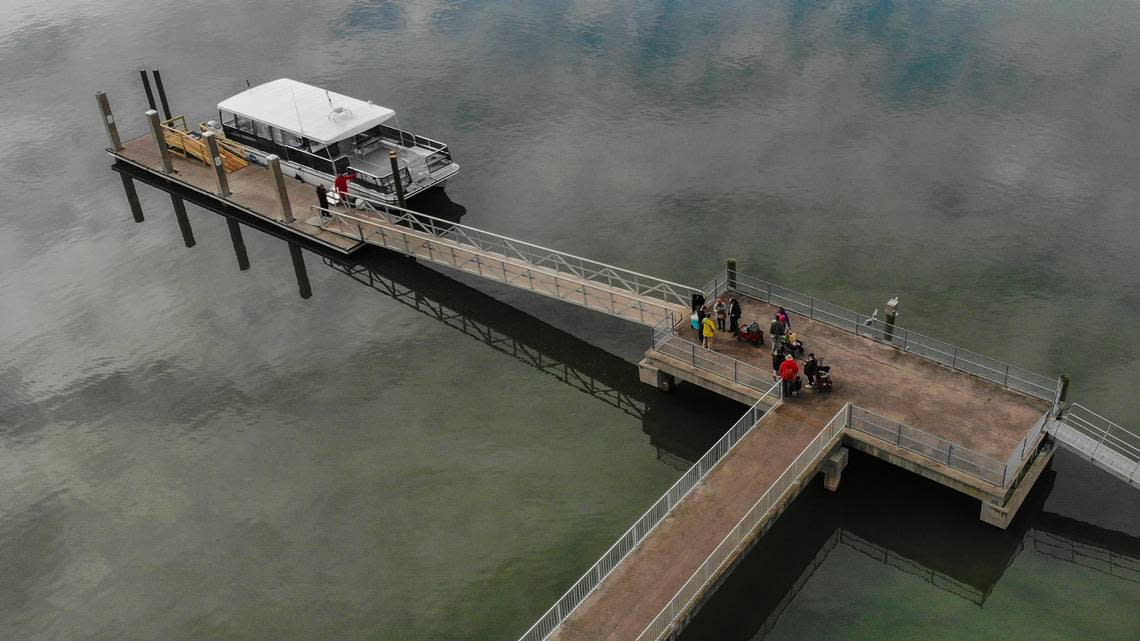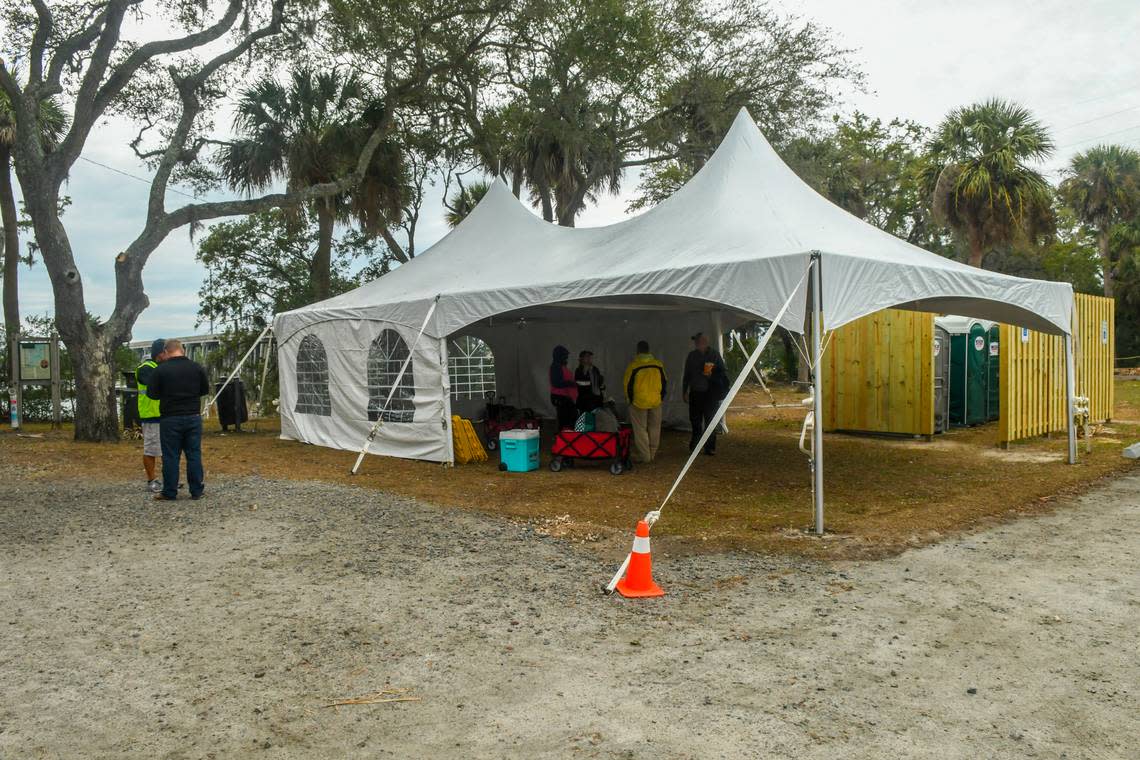‘Not providing what the community needs:’ Daufuskie residents aren’t happy with the new ferry
The county-operated public ferry between Hilton Head and Daufuskie Islands switched operators Tuesday, with many island residents fearing the beginning of new era of lower level service at higher prices.
About 100 Daufuskie Island residents packed into their bi-monthly Daufuskie Island Council meeting Tuesday night to voice their confusion with the ferry, frustration at new policies and feelings of neglect from the county. The island council has no legislative power but acts as a liaison to the county council. Beaufort County staff and representatives did not attend.
Many expressed that the oversights and service omissions that are part of this change illustrated another in a series of disconnects between Beaufort County government and Daufuskie residents.

The new operator of Lowcountry Ferry, Neil Turner, was in attendance for the meeting. Residents say the county and Turner could have worked to understand their needs by soliciting input during the bid procurement process.
“I think the county set (Turner) up for failure,” Daufuskie Island resident Karla Clark said. “I don’t think the county was transparent enough with what our needs were.”
Daufuskie Island resident Jeremey Quinn focused on the quality of service.
“It feels like a large step down from the previous service,” he said. “You’re not providing what the community needs, you’re providing what the county asked you to provide.”
Details on the boats and bids
Lowcountry Ferry started its services Tuesday with a temporary 47-foot-long catamaran, licensed to carry up to 49 passengers. Turner said in less than two weeks they expect to be using a larger boat, which will be climate controlled and have bathrooms, unlike the current, temporary solution. The proposal said the boat ride would be 45 minutes, but the actual rides during this transition period have been a little longer than an hour.

The initial proposal from Turner to the county identified two boats that would be acquired to satisfy the contract. Those boats were the Palmetto Merchant and the Palmetto Trader and are owned by Palmetto Marine. Haig Point used them for the public ferry for years. Turner said he wasn’t able to reach an agreement with the owners to use them and is now in the process of securing the Manatee II, a larger boat with air conditioning, heat and restroom facilities. The discrepancies raise questions about how much forethought Lowcountry Ferry and the county gave to the service.
Under the contract for 2024, Lowcountry Ferry will be paid $365,000 annually and retain “all ticket revenue.” The proposals also revealed Lowcountry Ferry is being paid $655,000 less than what the old contractor, Haig Point Community Association offered in their proposal for 2024 and beyond. Haig Point CEO Adam Martin said they could provide their old services for $1.02 million, suggesting that the new service won’t be as comprehensive as what was previously provided.
In their 2024 proposal, Haig Point increased their fee proposal to the $1.02 million total, up from the 2023 total of $375,000. This sharp increase could have pushed county leaders to look for a solution that was more in line with previous expenses.
Daufuskie Island’s simpler way of life
Locals take pride in a simpler way of life than most people who live on the mainland. Many residents make their living oystering and fishing, and some don’t have iPhones or computers.
They rely on the public ferry to transport weeks of groceries at a time, supplies for their businesses and pets for veterinary appointments. About 200 people live outside of the private Haig Point community, which has a ferry service that runs hourly and takes about 35 minutes each way. However, those residents say the county’s request for proposal didn’t consider that. It didn’t explicitly say if freight services needed to be included and was vague about whether “transportation,” meant solely persons or goods as well. Turner said it was his understanding it was only for a passenger and carry-on service between the islands.

Martin, who was previously responsible for the public ferry, understood otherwise.
“On each of those eight departures daily, or 10 on Fridays, we were carrying up to 2,000 pounds of cargo in some cases,” Martin said. “Transportation on Daufuskie is not just passengers, you have to have ways to get material back and forth too.”
The county never reached out to the Daufuskie Island council during the process or asked for input from islanders, according to Daufuskie Island Council Chairman John Schartner. Turner said he never rode the public ferry when the Haig Point Community Association ran the service.
“I was trying to, but it stormed that day,” Turner said when asked by an islander why he didn’t ride the old ferry to understand what services the old ferry provided, despite the county awarding Lowcountry Ferry the contract in early December. In September, Haig Point Community Association “expressed that they could no longer provided the service at the contract rate due to issues of uncertainty and risk,” according to Dec. 11 county council documents.
“We have really good knowledge of what the costs are and we needed a fair return,” Martin said, adding that he doesn’t believe it’s possible to provide Haig Point’s level of service for the amount of money Lowcountry Ferry is being paid now. Haig Point also allowed Emergency Medical Services, Beaufort County Sheriff’s Office and anyone else who needed to get to Daufuskie for public reasons such as the postal service to ride its private ferry as part of the contract, according to Martin. He said the county and Haig Point are in the process of negotiating a separate contract for those services.
The Beaufort County Council followed public records laws when they discussed the bid process and the county has a general online feedback forum, according to county spokesperson Hannah Nichols. Residents say that wasn’t enough, and the lack of communication resulted in a ferry system designed without the consideration of Daufuskie Island residents.
For example, island residents bring over freight such as building and business supplies because there aren’t major stores on Daufuskie, but the new ferry service page says it doesn’t offer freight services. Items other than one collapsible wagon per person will be put on a separate luggage boat, which might only be brought over once a day. Some residents don’t have computers or use credit cards, but the ferry system prefers paperless transactions. For residents who have to go to the mainland for veterinary services, pets require a $30 ticket each way. These were all concerns that Haig Point addressed when it was the contractor: there was a freight service, freight and luggage went over on the same boat, cash was welcome and pets were free.
Turner declined to answer questions from The Island Packet and Beaufort Gazette on two separate occasions. However, during the meeting Turner fielded an hour and a half of questions from residents in what seemed like the first time he heard many of their expectations. For example, he said that the service will work with residents who need to make reservations by phone or pay by cash.
The exchanges between Daufuskie residents and Turner was never volatile, but residents didn’t hold back: “some people don’t have your money,” one resident said when discussing pet ticket prices, saying that the ferry was being looked at as a “money grab” instead of a public service. They said they were frustrated at their county council representative, Mark Lawson, not answering phone calls or texts. Lawson hasn’t returned phone calls and text for comment from The Island Packet and Beaufort Gazette.
Another resident said when he had concerns whether his wife, who is disabled, would be able board comfortably, Turner talked through it on the phone with him that day.
“I will learn your needs (and) I will learn the needs of tourism in order to make sure that we can facilitate what needs to be facilitated,” Turner said of the service as a whole, adding that he will be able to adjust the service in the future.
Regardless, the meeting left island residents wondering why there wasn’t an effort to understand their needs before the boats made the journey across the Calibogue Sound, especially when the previous contractor did.
“That’s a sticky situation for residents who are going to wait a week, a month, a year, for this situation to work itself out,” said Quinn, who has lived on Daufuskie Island for eight years.
